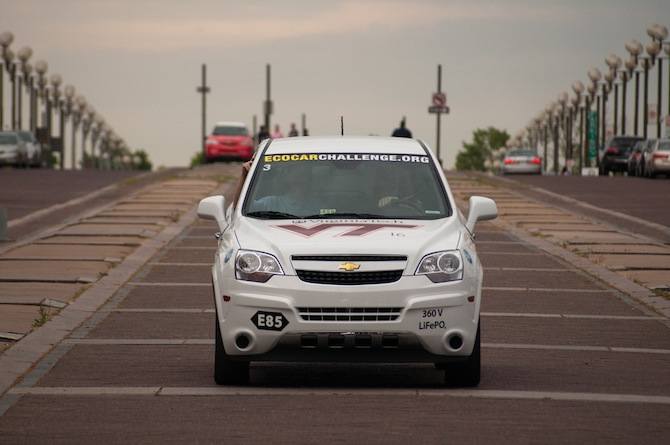
After three years of competition, collaboration and electrification, the EcoCAR Challenge is over, and the student-engineers at Virginia Tech have come out on top with an extended-range EV powered by E85 fuel.
By modifying an existing GM vehicle to maximize fuel economy yet still appeal to consumers, Virginia Tech’s team met incremental goals and challenges throughout the entire competition while building their car, known as the VT-Rex. That put the team first among the sixteen teams participating in the three-year challenge, sponsored by the US Department of Energy and General Motors.
Of course, a final MPG rating of 81.9 didn’t hurt, either, especially considering they’d gained a 70 percent improvement over the original donor vehicle, a Saturn VUE.
Unlike other college vehicle-building competitions, the EcoCAR Challenge is unique in that it awards points for mileage as well as usability. VT-Rex features such amenities as a touchscreen interface, vehicle power status meter and all the safety features of any new car found on a dealer’s lot. Some competitors had more interesting powertrains and better gas mileage, but they didn’t meet the real-world challenges of building a car ready for customers.
That the original donor vehicle’s brand has been shuttered since the competition began is a good example of just how much the auto industry has changed since 2008, and how much work it takes to build a production-ready vehicle. It’s an experience that many of the involved students will draw inspiration from in the future, as one of the competition’s goals was to prepare students for careers in the auto industry.
“Designing an extended-range electric vehicle using E85 was challenging, but clearly worth it in the end,” said Virginia Tech’s co-team leader Patrick Walsh. “The entire team has put so much time and effort into designing and refining our vehicle, and we’ve gained valuable knowledge and hands-on experience that will prepare us for our engineering careers.”
While the VT-Rex obviously impressed the judges, the other vehicles involved in the competition also attracted notice. Ohio State came in second with another E85-fueled extended-range EV, and the University of Waterloo came in third with a fuel cell vehicle that presented numerous engineering challenges throughout the competition.
We’ve been following the EcoCAR challenge since the beginning. If all the participating students end up working in the auto industry, we’ll be very excited to drive what comes next.
Article courtesy of wired.com

